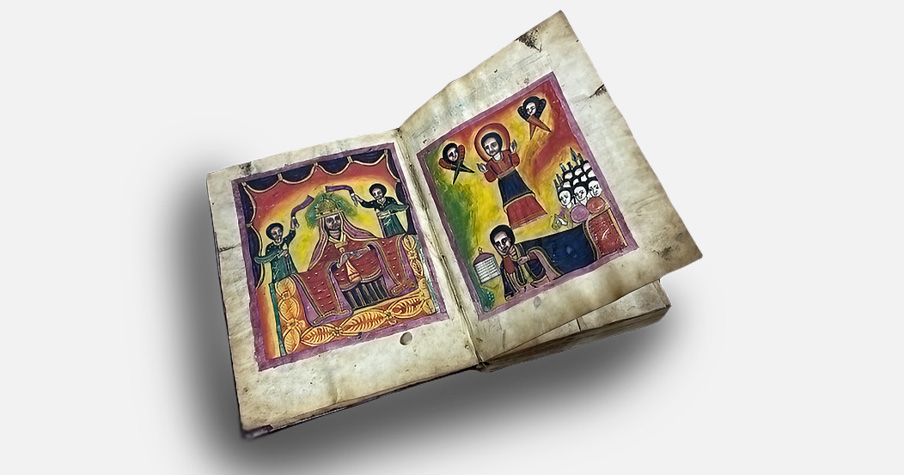
Studer’s collection features an early 20th century Ge’ez Psalms codex from Ethiopia, hand-lettered on vellum with ancient techniques. Photo by Rachel Fonseca
As a student in the 1940s, gerald studer collected stamps. When he entered the ministry, he decided to switch to Bibles. “It was a little more time- and space-intensive than stamp collecting,” said Karl Stutzman, director of Library Services at Anabaptist Mennonite Biblical Seminary (AMBS) in Elkhart, Indiana, now home to the Studer Bible Collection.
Studer’s daughter remembers her dad, a Mennonite pastor, who served congregations in Ohio and Pennsylvania, looking for Bibles during family trips. His wife, Marilyn, did her part by collecting children’s Bibles. Missionary friends would bring Studer editions published in distant locales. At one point, Studer got wind that the American Bible Society was emptying a storage area. He inquired whether any Bibles or Bible portions were among those to be relinquished and was rewarded with over a thousand volumes comprising hundreds of languages.
After several decades, Studer had acquired more than 5,000 items. He began donating the collection to AMBS, the successor institution of his alma mater, Goshen Biblical Seminary, in 1971. It took over three decades to transfer the entire collection to the seminary. Since then, AMBS has added to the collection.
“Given our identity as a biblical seminary and as a global seminary, I think this Bible collection really fits both of those emphases,” Stutzman says. His favorite items in the collection include two 16th-century Froschauer Bibles and two Ethiopian Psalms manuscripts.
The Froschauer Bible, also known as the Zurich Bible – so named because it was produced by the printer Christoph Froschauer in Zurich – became the favored Bible translation of the early Anabaptists. The copies at Annabaptist Mennonite were printed in 1571 and 1580. The 1571 edition bears an inscription from its owner, Elisabeth Bachmann, that reads, in German: “This Bible is dear and precious to me, and he who steals it is a thief.”
The Ethiopian Psalms manuscripts (written in Ge’ez, the ancient Semitic liturgical language of the Ethiopian Orthodox Tewahedo Church) were produced in the early 20th century, so they aren’t particularly rare, but they were produced by monks of the Ethiopian Orthodox Church using ancient manuscript production techniques. While similar copies exist online, Stutzman and other faculty members appreciate the opportunity for students learning about manuscript production to handle the items and see up close the work of the scribes.
The connection to Ethiopia is also special: AMBS has a relationship with the Meserete Kristos Seminary (MKS) in Bishoftu, and Ethiopian seminarians have studied at AMBS. While the Meserete Kristos Church is evangelical and not Orthodox, Stutzman says that their MKS students have great respect for the way the Orthodox tradition has preserved Ethiopian Christianity. “It’s a key part of Ethiopian identity and culture. For MK pastors coming here and seeing those volumes, it’s like, ‘Oh yeah, this is ours. This is a part of our story.’”
Much of the Studer collection remains uncatalogued – it’s a project he hopes to undertake with grant funding. For now, he says the uncatalogued portion is an exciting enigma: “It’s just neat to be able to pull off the shelf at least a piece of the Bible in so many languages.”